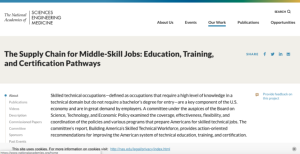The Supply Chain for Middle-Skill Jobs: Education, Training, and Certification Pathways

Despite the emphasis in public discourse on the value of a four-year college education, in 2011 only 30 percent of young adults in the United States had completed a bachelor's degree, a fraction that is expected to increase slowly over the next decade. Moreover, some of the fastest growing technical occupations, such as energy production technology and information technology, demand skills most often acquired in settings other than four-year college degree programs. This project is not only clarifying workers' options for preparing for middle-skill technical jobs but also identifying needed improvements in the management, coordination, and financing of such pathways, thus contributing to expanding opportunities for individuals and for employers in the United States.
The National Research Council (NRC) and the National Academy of Engineering (NAE) are collaborating to conduct a consensus study of the multiple education and training pathways to middle-skill technical jobs that do not require a baccalaureate or higher degree. The NRC and NAE are convening an expert committee to examine the coverage, effectiveness, and flexibility of these avenues of technical preparation and skill certification and the extent of coordination among them. In addition to reviewing the literature, the expert committee is convening a national symposium to gather evidence on these topics. The committee is authoring a consensus report with conclusions and action-oriented recommendations for improving the various technical education, training, and certification programs, creating a more coherent and effective system of workforce preparation, and communicating options to citizens interested in pursuing careers in such occupations. The report is expected to guide federal and state policymakers and administrators, educators, employers, labor organizations, and other stakeholders in preparing Americans for middle-skill jobs supporting middle-class livelihoods and in meeting employer needs for a skilled, competitive workforce.
In addition to recommendations to policymakers, employers, and other stakeholders, an important product of the project will be a road map to training, education and certification opportunities, useful to counselors but couched in terms accessible to individuals seeking to improve their skills and employment opportunities.
Following the NRC's institutional policies, the committee's report is being reviewed anonymously by experts who did not serve on the study committee but who represent a range of expertise comparable to that of committee members. In keeping with standard NRC policy, the sponsor does not have a role in the process but is informed of the conclusions and recommendations when the institution certifies successful completion of the review.
About

Comments